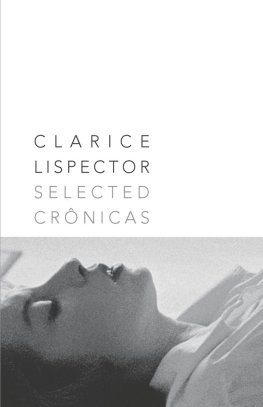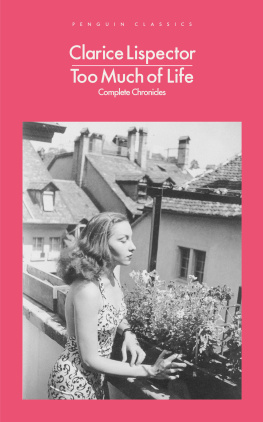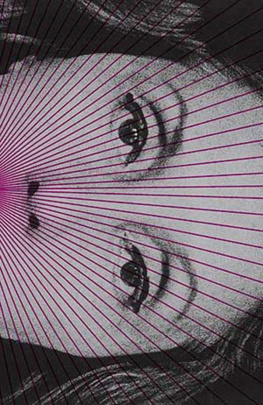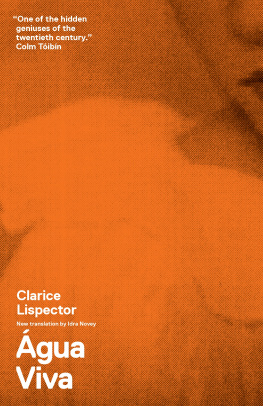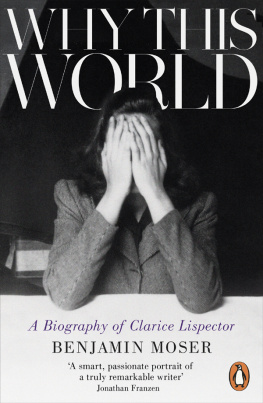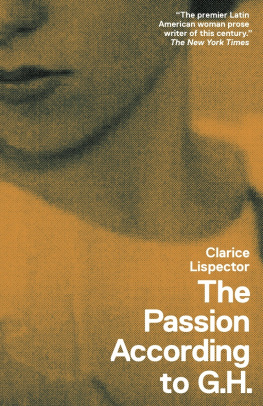Clarice Lispector
Selected Cronicas
CLARICE LISPECTOR is widely recognized as the most original and innovative Brazilian woman writer of this century. In 1984, seven years after she died of cancer, Lispectors son edited the so-called crnicas or chronicles which she published in the Saturday edition of the Jornal do Brasil [The Brazilian News] from August 1967 until December 1973. Arranged in chronological order, the book (A Descoberta do Mundo)* is a miscellaneous collection of aphorisms, diary entries, reminiscences, travel notes, interviews, serialized stories, essays, loosely defined as chronicles: a genre peculiar to Brazil which allows poets and writers to address a wider readership on a vast range of topics and themes. The general tone is one of greater freedom and intimacy than one finds in comparable articles or weekly columns in the European or U.S. press.
Lispector confessed she did not find it easy to adapt to the genre. She inquired: Is the chronicle a story? a conversation? the revelation of ones inner thoughts? She questioned the wisdom of tackling a genre which to some extent was alien to her introspective nature. Summing up her disquiet, she commented: I am apprehensive. Writing too much and too often can contaminate the word or as Fernando Pessoa, a Portuguese poet whom she admired, once said: Speaking is the easiest way of becoming unknown. She was afraid of becoming too personal, and the need to be topical and conform to the conditions and constraints of a weekly column worried her. As she acquired more confidence, she freely adapted the genre to suit her own purpose.
Varied and unpredictable, the chronicles allow us to piece together the life and career of this singular personality. The chronicles register contrasting moods, one moment whimsical, the next grave and questioning, but whatever the theme, disarmingly frank.
The autobiographical details in some of the chronicles offer a reliable account of her origins and background, and help to clarify a number of misconceptions. Her parents emigrated from the Ukraine to Alagoas in north-eastern Brazil when she was barely two months old. They subsequently moved on to Recife in Pernambuco, where her father found employment in agriculture, then commerce. The family had little money and her mother was in poor health. The youngest of three sisters, Lispector had a happy childhood, notwithstanding the difficulties her parents experienced in adjusting to their new environment. Precocious and imaginative, she soon discovered the world of books and by the age of seven she was already writing stories. She recalled: I thought a book was like a tree, an animal, something that grows. I had no idea there was an author standing in the wings. She submitted her stories to the local Dirio de Pernambuco [The Pernambucan Daily News] which ran a childrens page, but they were rejected. For, even as a child, Lispector was much less interested in plot than in sensation, perception or intuition.
When she was twelve, the family moved to Rio which was then the capital. The year was 1937 and it coincided with the dictatorship of Getlio Vargas and the formation of Brazils New State. On completing her schooling, Lispector decided to study law. While still at the university she also began writing for A Noite [The Evening News]. This introduced her to the world of journalism and she covered a wide range of features with the exception of crime reports and the social column. Meanwhile, her interest in law began to wane but she persevered and completed the course. She soon abandoned any idea of practising law, however, and as she was to observe wryly: My law studies taught me nothing, not even how to protect the copyright of my own books. In 1943 she married a fellow student, Maury Gurgel Valente, who was soon to enter the diplomatic service, and in the following year she published her first novel Perto do Corao selvagem [Near to the Wild Heart]. Lispector was seventeen and unknown, but the unusual form and extraordinary language of this brutally honest account of marriage and betrayal attracted the attention of several important literary critics. Srgio Milliet and Antnio Cndido recognized at once that a promising new writer had made her dbut. Their reviews spoke of a sudden break with established criteria and of a radically different concept of fiction, which opened up new possibilities. Her dbut was timely.
Marriage to a diplomat meant foreign postings: Naples, Berne, Torquay, and Washington; the birth of two sons, Pedro (in Berne in 1949) and Paulo (in Washington in 1953), meant additional responsibilities. For some sixteen years Lispector was to be separated from her beloved Brazil, apart from brief return visits which only intensified her sense of exile and homesickness. She detested the social obligations required of a diplomats wife. Writing became increasingly important for her spiritual survival. She longed for greater privacy in order to be able to meditate and write her books. Writing became synonymous with solitude and a more profound form of existence, and only her work and children kept her sane during those years in alien surroundings. In 1959, she finally separated from her husband and returned to Rio with her children. She was now free to concentrate on her chosen career. Her output was steady, and by the time she died of cancer in the winter of 1977, she had produced nine novels, eight collections of short stories, four tales for children and a Portuguese translation of Oscar Wildes The Picture of Dorian Gray.
Despite her Ukrainian ancestry, Lispector identified completely with Brazil and most of all with north-eastern Brazil. Memories of her childhood, especially in Recife, evoked the authentic Brazil where traditions and folklore had been preserved. A slight speech defect made her sound like a foreigner, but she was adamant that she had forged her soul and innermost thoughts with the Portuguese language, a difficult language, which she was to transform and even re-invent by means of conceptual refinements, subtle nuances and bold experiments with syntax.
Brazils other great writer of this century, Joo Guimares Rosa, once told her: Clarice, I dont read you just for the literature, but in order to learn about life. Most readers would agree. Her dramatic insights can surprise and shock, amuse and distress. Such is the intensity and vehemence of her prose that it unleashes everything which is gentle and violent in this world of ours. And as she herself confided: Everything affects me I see too much, hear too much, everything demands too much of me.
The intimate revelations of the crnicas take us through the various stages of womanhood from innocence to awakening perceptions of good and evil. The transition from adolescence to maturity is one of solemn rites, at once delicate and vulnerable. The lurking fear of ambush, both physical and emotional, is central to many of the narratives. Lispector walked the perilous path of life in fear and trepidation, yet she was curious and determined to unravel the mystery of existence. She dubbed herself an audacious coward (uma ousada encabulada) and confronted life on those terms.
In all her work there is relentless self-questioning. Aware that she was speaking on behalf of all mankind, she was wont to say: I am so mysterious that I do not understand myself. She saw the human condition as flawed, fragmentary and incomplete; the darker side of our nature as being compounded of fear, revulsion, cruelty and hatred. But once having recognized the inherent contradictions, she set about trying to reconcile freedom with restraint, humility with pride, solitude with the need to communicate. Strength had to be drawn from weakness, human reversals transformed into salvation.
In a television interview in February 1977, she confessed: When I am not writing, I am dead. She believed that writing could turn a human being into a divinity. And when the words flowed in harmony with thought and feeling, she experienced something akin to ecstasy. She staunchly defended her individual freedom as a writer and insisted: If there exists such a thing as expression, then let it emanate from what I am. Appropriately enough, the last item in this collection leaves us with the question which was to haunt her all her life: Could it be that the person who sees most, feels and suffers most? That was the price she paid for the rare insights she so memorably expressed.

